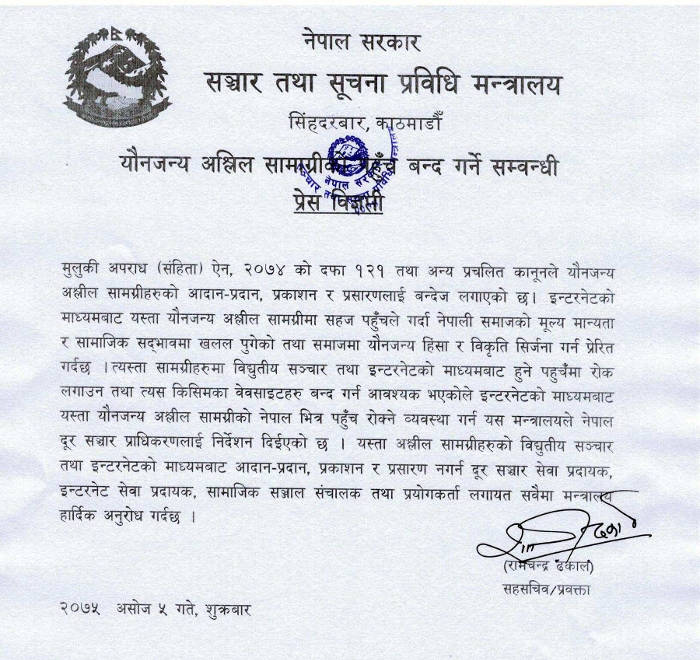On 21 September 2018, Ministry of Communication and Information Technology declared that it was going to ban digital pornography. It claimed that the premise for the ban was article 121 of the Criminal Code of 2074 which states that “the internet has made it easy to access sexually obscene materials, disrupted the social values and beliefs of Nepali society and is thus encouraging sexual violence and harmful practices.” This is the second time the government has cracked down on porn after the short-lived ban in 2010 which was supposed to “fight pornography addiction.”

Press release claims Nepal’s civil law allows banning “sexual and vulgar material.”
Something similar took place in India a couple of years ago, where the Indian government placed a ban on pornography in August 2015 but lifted it within a week after public outrage from those concerned about internet freedom. The Indian government’s purported logic for the ban was to to prevent children from accessing pornography, and to “control sex crimes.”
Something similar took place in India a couple of years ago, where the Indian government placed a ban on pornography in August 2015 but lifted it within a week after public outrage from those concerned about internet freedom. The Indian government’s purported logic for the ban was to to prevent children from accessing pornography, and to “control sex crimes.”
The fact that the porn ban has been posed as a solution to sexual violence is questionable. There is no definitive evidence that shows that porn leads to sex crimes. The ban is a reactionary move by the government to the demand for justice for rapes that have led to outcry in the media and streets for months. It is merely a diversionary tactic to hide the government’s incompetence in prosecuting rapists.
The basis for banning porn in both the Indian and the Nepali case appear to be a concern with the “obscene.” It is therefore worth examining what “obscenity” is. The word has been used repeatedly in the 2018 Civil Code, despite never having been defined. Along with “obscenity,” words such as “morality” and “decency” are in many articles in laws and policies. This is not to say that it is desirable for the state or the judiciary to define abstract concepts like obscenity and morality, because those in positions of power can do so arbitrarily.
Policing the bodies of women and girls, LGBTIQ (Lesbian Gay Bisexual Transgender Intersex Queer) and indigenous and non-dominant ethnic groups using legal and social norms is common — be it the restriction against wearing skirts and shorts in courts and certain public offices, or the sexual cleansing of transgenders in the streets of Kathmandu at night, or the nature of social campaigns that valorise the culture of Khas Arya women. Restrictive citizenship laws are another example of the patriarchal state trying to control women’s autonomy. Societies have always been petrified of women’s sexual freedom, and when a woman expresses her desires, vague concepts such as morality and decency are imposed to police her behavior. The porn ban reflects the discomfort the state feels when people explore their sexuality outside of treating the body as a means for having children.
Social beliefs have historically been used as a tool of social control to punish behaviors that are thought to be deviant from the norm. It is common for people to be censured for behaviors such as living with a partner outside of marriage, having a child out of wedlock, not attending family ceremonies or cultural practices, and engaging in bodily expression that cross boundaries set by dominant cisgender heteronormative culture. All of these behaviors are seen as being against social beliefs.
There are other issues with the ban that need to be addressed. It is much more than just a ban on allegedly obscene material. It infringes on the right to information and freedom of expression. Moreover, such internet censorship shrinks the already small space available for women and queer people to explore their sexualities. It can lead to blocking access to materials that provide people with sex education, information related to sexual and reproductive health, and sexually transmitted diseases. It can deny access to social media accounts and pages that are spaces for people to talk about their sexuality and desires. When a porn ban was placed in 2010, internet censorship blocked some educational websites related to sexual health and even scientific research-based websites.
Online spaces are essential for knowledge and activism, and it is important for marginalized groups such as LGBTIQ to find their community and seek information related to their queerness. The porn ban is likely to disproportionately impact these groups.
The government’s protectionist approach and savior complex, reflected in the porn ban is misguided. A better approach to addressing sexual violence would be to empower people and respect their sexual agency, and punish the perpetrators of sex crimes. Instead of censoring materials on the internet, the government should direct its attention towards ending impunity instead of trying to find quick-fixes. Safe, sex-positive internet spaces that women and girls take part in creating are far better than the demonisation and scapegoating of all things sexual on digital spaces.
